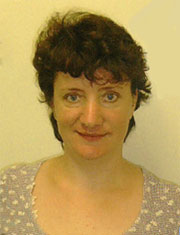Larissa comes from a family of six children which may be why the family unit is very important to her. She came to settle in Portland because her sister and her family live here
| Larissa: | When I (.) went to United States I have a (.) couple mm tha-that mm first tuh first I live out ((laughs)) about my sister. Live uh together my family. | |
| IR: | Mm hm. | |
| Larissa: | Because I feel comfort (.) only my family. | |
| Hide Conversation | ||
Her sister babysat for her children while Larissa went to class and she often talked about her in class activities (Click to View) (Requires Internet Explorer).
As Larissa was a stay at home mother, her interactions with family are crucial to understanding her language use and its effects on English language learning. In her first interview in January 2003, Larissa reported speaking both Russian and English to both her husband and her older daughter. In the second and third interviews
(2004 and 2005), however, she reported speaking only Russian at home.
While maintenance of family communication often does not allow immigrant-learners opportunities to use English outside their classrooms, school-aged children often provide such opportunities for parents. These opportunities arise via the children's schoolwork and because of the need for parents to know what their children are doing in their lives in English. This was the case for Larissa as well. She consistently citing helping children with homework as one of her reasons to know English.
In her fourth interview, Larissa speaks of using English with her daughter to help her with her homework.
| Larissa: | I use English more, since now my child has to do her homework and read books. So, I have to spend more time studying English myself in order to help her. When we're reading in English, I'd stop and say [in Russian] "What is the bunny doing?" She would explain it to me. I don't understand that as well as she does. Or, when I read directions for homework, I would ask her "Did you understand?" She says "Yes, I understood everything." | |
| Hide Conversation | ||
Larissa also mentioned the need to know English so that it does not become a code language - so that she can understand what her children are speaking about with their friends.
21:10-22:10
| IR: | So, do you think your husband and your children are helping you now with studying English? | |
| Larissa: | My children are helping me with it. The other day my daughter said something to me in English. I had to ask her what it means. So, now I understand that I need to study English, so my child can't fool me. Like if she talks on the phone to somebody and I have no idea what she's talking about, I wouldn't like that. I understand when she grows up she'll speak English with friends and so on. I don't want to feel like a fool. | |
| Hide Conversation | ||
Larissa also often mentioned her husband and her children in class. She makes the connection between their place in the "outside world" - her husband works full time "for an American company" and her oldest child goes to school. She mentions this situation in comparing her English language fluency with theirs (Click to View) (Requires Internet Explorer).
